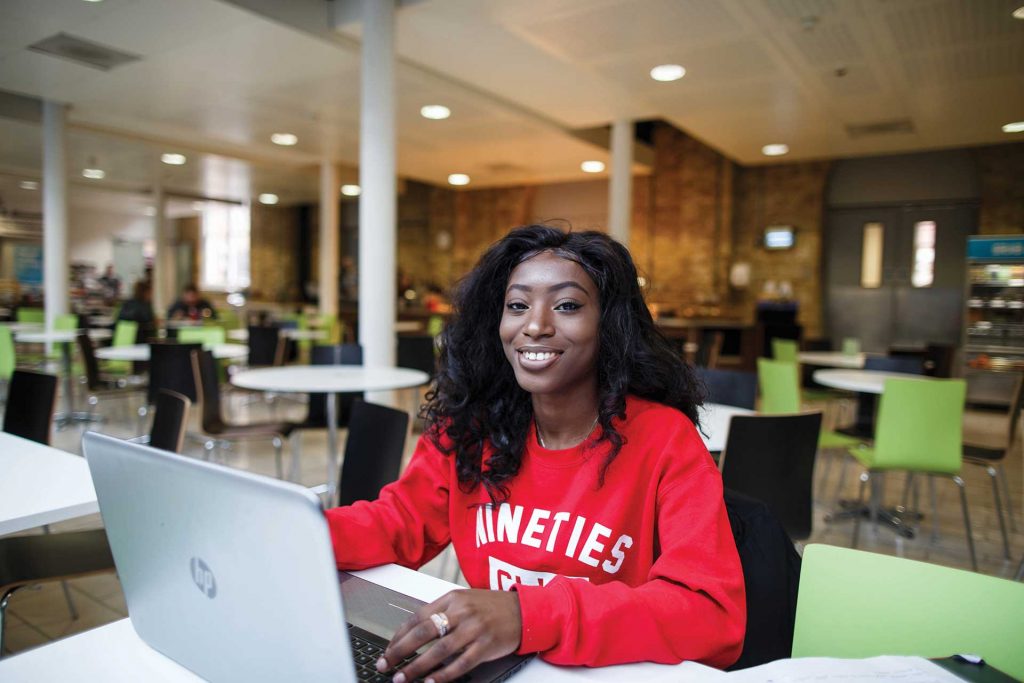You were recently employed as a research assistant for a University of Kent diversity project. Can you tell us a little more about the project?
The project was to diversify the curriculum, to make it more representative, initially, in terms of gender and race. In order to do this, we had to provide factual evidence, so the project team embarked on an audit to create the evidential basis for this. Then conversations and actions could be implemented to liberate the curriculum.
What did your role involve?
My role was to audit set reading lists by finding the nationalities and ethnicities of authors within the modules.
The main tool I used was the internet. Google Scholar and Amazon were very helpful in cross-referencing the sources and making sure all the authors were accounted for.
Another aspect of my role was to conduct a focus group. Collins and I recruited the participants, and we asked the students questions based on their sense of belonging in the university as well as their perceptions of their reading lists for their courses. I also analysed the audited data and each module convenor was sent bar charts with the percentages of ethnicities that were present in their individual modules.
How did it feel to contribute to a real project?
It felt really enriching knowing I was contributing to a project bigger than myself, that could actually make long-lasting change to my university curriculum. To know that I was part of a much-needed cause, made the project all the more worthwhile.
In efforts to liberate the curriculum I was also liberating my mind and perspective. Realising the limitations in the reading lists also helped me understand the unconscious impact and unrepresentative curriculum may have on BAME students, including myself. This project was essentially changing the narrative that a ‘dead white male’ curriculum was absolute. As a student myself, and a black woman, I found contributing to that was fulfilling.
What impact do you think you had on the project’s success?
The impact I think I had on the project was actually creating data to emphasise that the prominence of a ‘white British male’ oriented curriculum was a reality, not just an idea or an assumption.
This forced conversations to start amongst academics and students about the state of representativeness in the curriculum and how that impacted a sense of belonging for students. Also, being a student myself, I think this had a great impact on students in terms of relatability.
I think I was also successful in getting the academics to understand the impact of unrepresentativeness from a student’s perspective directly, rather than statistics that cannot provide the insight and personability of a student themselves.
What skills do you think you gained from this experience?
I have gained many valuable skills from this role including confidence in public speaking, research-based analysis and leadership. With this role we did numerous speeches at events, teacher seminars and conferences to students as well as academics.
Having to do such, increased my confidence in public speaking and what was initially a nerve-racking prospect became excitement in wanting to share our cause and explain our work. Also, this grew our confidence in the project and grew our confidence in speaking publicly in a variety of different settings and in front of different types of crowds.
This also improved my leadership skills when embarking on different aspects of the project such as leading focus groups to assess student thought on the reading lists and sense of belonging. Conducting a focus group helped me understand how crucial it was to hear students’ voices. This is not only to improve engagement, as they are the ones using the reading lists, but also informing students that the University is willing to hear their thoughts and that their opinions actually matter.
This role also helped my organisation skills, with working towards deadlines, particularly in the audit stage and the preparation of the speeches, while trying to manage university also. I learned to prioritise and have a good balance to ensure I was working effectively and efficiently for all the different roles in my life.
Do you have any advice for future students about gaining employability skills?
When you’re presented with opportunities, do not be afraid to say yes, even if you are unfamiliar with the concept.
You should feel the fear and do it anyway. Learning and gaining new experiences that may be out of your comfort zone will prepare you for the ‘real’ world and the challenges you may face there.
Also, do not be afraid to go out and seek opportunities, this can include networking, joining societies, asking for help from your lecturers when needed.
Students should also try and get some sort of experience that relates to their course, assuming they want to do something related to it in the future.
Employers appreciate experience and this can be done through volunteering, placements and internships.
Make the most of your university experience, go to the career advisors and employability fairs. Make yourself stand out by the time you have graduated. Make your degree a strong component of employability but not the only one.
University is full of experiences, so take advantage of them.

